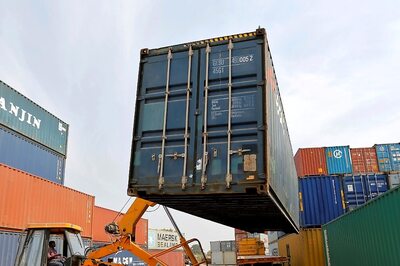
views
The issue of freebies, though not new, has been causing particular controversy in India ever since the Aam Aadmi Party (AAP) adopted it unashamedly to bribe the electorate during the Delhi Assembly elections, evidently with good partisan effect. It is now before the courts, but unlikely to be resolved judicially since supposed freebies are clearly the province of Parliament and the Electoral Commission (EC) has passed the buck back to it. Interestingly, the government itself seems chary of handling this vexatious hot potato as well and had suggested the EC deal with it. Freebies are not merely about bribery as such and their financial and budgetary sustainability, but actually articulate an issue at the heart of the functioning of the Indian polity.
In fact, the issue of freebies is a fascinatingly complex intellectual issue with important international and historic political and economic dimensions as well. The notorious first century AD emperor Nero distributed free grain to the Roman populace after a devastating fire destroyed the city though by ruinously looting the rest of the Roman empire to do it and keeping a handsome part of the loot for himself too; an important aspect of freebies since its disbursers usually benefit from them too. At the heart of freebies is the central question of who pays for them!
Freebies are only one manifestation of public largesse of the much larger typology of public subsidisation of citizens or indeed others, for whatever purpose. In fact, the recent freebies at issue of transport and discounted electricity and water supplies in Delhi cost a fraction of India’s MSP and fertilizer subsidies, which are not entirely free but incorporate a substantial grant element. Both the latter as well as complete freebies highlight similar problems, the cost of financing, who eventually shoulders their burden and the degree of misallocation of resources in which they result.
In general, the cost of financing freebies and social welfare programmes is becoming an issue in many states, threatening bankruptcy to Punjab, West Bengal and Andhra Pradesh and also appears to portend serious budgetary crisis in others. Among the most notoriously problematic is Punjab’s electricity subsidy and its rising cost to the state exchequer, over 16% of total revenues. Such revenue expenditure reduces capital allocations essential for long-term growth and has a negative impact on industry. This is an issue in the Punjab though its per unit electricity tariff for industrial users is similar to that of Tamil Nadu though approximately 50% higher than in Gujarat. Both Punjab and Tamil Nadu discoms have significant debts owing to the policy of subsidies to domestic users in both states.
Freebies and subsidies impact budgetary allocations and the most problematic is the resulting sacrifice through current consumption of capital investment for future growth, which benefits both the individual and empowers India in a competitive world. In India’s case, it is a matter of urgency if it is to reach the aspired $10-trillion benchmark to begin approaching the level of its existential neighbourhood rival, China, as well as gain respite from instrumental international pressures originating elsewhere.
The second issue of political significance and potentially increasingly explosive is the unavoidable cross-subsidy, when some states are threatened with bankruptcy owing to indiscriminate freebies and social welfare subsidies. Ineluctably, the bailouts will effectively means transfer between Indian states and likely to precipitate highly divisive resentment.
Freebies and social welfare schemes that subsidise the populace are a universal phenomenon, whether in the shape of Britain’s increasingly expensive National Health Service, virtually free at the point of delivery, or the welfare benefits to the unemployed and disabled in all developed countries. In every case, funding them is an issue and there are difficult choices to be made between alternative uses of limited budgetary resources. A salutary general counterpoint is defense spending, which though unavoidable, is dismaying in the resources it uses up, for example, the $21,000 hourly cost of flying a modern jet fighter, which is even higher for newer models.
There are some important issues in the case of freebies where India is concerned and perhaps in other relatively poor countries too. Gifting 300 units of free electricity to the least well off is not morally reprehensible. However, cumulatively it does mean sacrificing the future for the present through a bloated subsidy bill. The outcome has potentially serious associated implications of bankruptcy for the state concerned and controversial inter-state transfers to stave it off being consigned to the future, though cynical politicians hardly care.
Unfortunately, it is very hard to make a persuasive argument to the poor about the future benefits of present forbearance when they are struggling to make ends meet, unable to fund food and shelter, which exceed in importance even their essential need for electricity and energy supplies.
In the end, cynical politicians will surely play on such private material deprivations to further their own political aims and AAP has shown it can be an effective tool for winning elections. The grave danger is the use of freebies by treacherous politicians, who are being promoted India’s foreign adversaries, to help them seize political power within India. They can seriously undermine its national interest, the dangers of which have been illustrated by the MoU signed by the Indian Congress and the Chinese Communist Party in 2008 and deepening foreign interference in Indian elections.
Legislating against freebies, which are really only one form of welfare spending, will be impossible politically and constitutionally insupportable because at every turn there are transfer payments to the impecunious through myriad legitimate schemes. Sanctioning states for exceeding a certain level of borrowing is also problematic though unambiguous policy guidelines already exist.
If some rationality is to be introduced into the disbursement of freebies and subsidies, Indian politicians will first need to improve their credibility with voters. They will need to address the huge trust deficit that understandably exists in the Indian polity owing to rampant wrongdoing and corruption. It prompts ordinary citizens to conclude they might as well accept whatever is on offer rather than believe what politicians tell them about a rosy future. But it is possible to change how citizens behave as Narendra Modi showed in Gujarat, by successfully persuading voters to discard the theft of power in exchange for its uninterrupted 24-hour supply. The same voters rejected the AAP offers of bribes to win votes recently in Gujarat.
One day, India might aspire to reach the Scandinavian social contract that motivates people to practice self-imposed restraint in exchange for the greater good though, perhaps, it will first require India’s enrichment and achievement of the $10 trillion GDP goal.
The writer taught international political economy for more than two decades at the London School of Economics and Political Science. The views expressed in this article are those of the author and do not represent the stand of this publication.
Read the Latest News and Breaking News here




















Comments
0 comment